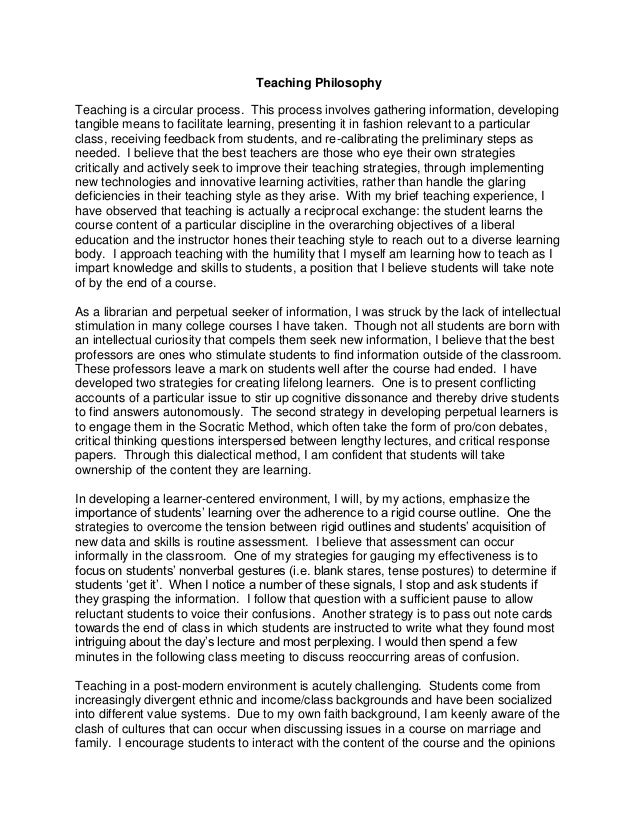Teaching Philosophy My philosophy as an elementary school educator has evolved over the past few years, guided by my intense passion for teaching and the diverse classroom experiences and learning environments to which I have been exposed. My educational philosophy is that I believe all students are capable of learning. They all do not learn at the same rate, but with different methods and strategies it is possible. Students should not be thought of as mindless individuals just waiting to be filled with knowledge by their teachers. Teaching Philosophy is a peer-reviewed academic journal devoted to the practical and theoretical discussion of teaching and learning philosophy, that is philosophy education.Established by Arnold Wilson in 1975, it has published over 2,500 articles and reviews in this field. Notable contributors include Norman Bowie, Myles Brand, Peter Caws, Angela Davis, Daniel Dennett, Alasdair MacIntyre. It’s an explanation of your values and beliefs as they relate to teaching. 1 Your philosophy is often a combination of methods you studied in college or graduate school and lessons learned during any professional experience since then. It may also draw upon your own experience of childhood education either as a parent or as a child yourself. We surveyed thousands of teachers about their teaching philosophy and the results may provide some insights to help you reflect on your own approach to teaching. Authoritarian vs Liberals In an earlier Teacher Tapp survey, we asked teachers if they subscribed to a “traditionalist” or a “progressive” teaching philosophy.
Getting started
Your reasons for writing a teaching philosophy may vary. You might be writing it as an exercise in concisely documenting your beliefs so that you can easily articulate them to your students, peers, or a search committee. It might serve as the introduction to your teaching portfolio. Or, it can serve as a means of professional growth as it requires you to give examples of how you enact your philosophy, thus requiring you to consider the degree to which your teaching is congruent with your beliefs.
Generating ideas
Teaching philosophies express your values and beliefs about teaching. They are personal statements that introduce you, as a teacher, to your reader. As such, they are written in the first person and convey a confident, professional tone. When writing a teaching philosophy, use specific examples to illustrate your points. You should also discuss how your values and beliefs about teaching fit into the context of your discipline.
Below are categories you might address with prompts to help you begin generating ideas. Work through each category, spending time thinking about the prompts and writing your ideas down. These notes will comprise the material you’ll use to write the first draft of your teaching philosophy statement. It will help if you include both general ideas (‘I endeavor to create lifelong learners’) as well as specifics about how you will enact those goals. A teaching philosophy template (pdf) is also available to help you get started. 89: thats not fair.
Questions to prompt your thinking
Your concept of learning
What do you mean by learning? What happens in a successful learning situation? Note what constitutes 'learning' or 'mastery' in your discipline.
Your concept of teaching
What are your values, beliefs, and aspirations as a teacher? Do you wish to encourage mastery, competency, transformational learning, lifelong learning, general transference of skills, critical thinking? What does a perfect teaching situation look like to you and why? How are the values and beliefs realized in classroom activities? You may discuss course materials, lesson plans, activities, assignments, and assessment instruments.
Teaching Philosophy Journal

Your goals for students
What skills should students obtain as a result of your teaching? Think about your ideal student and what the outcomes of your teaching would be in terms of this student's knowledge or behavior. Address the goals you have for specific classes or curricula and that rational behind them (i.e., critical thinking, writing, or problem solving).
Your teaching methods
What methods will you consider to reach these goals and objectives? What are your beliefs regarding learning theory and specific strategies you would use, such as case studies, group work, simulations, interactive lectures? You might also want to include any new ideas or strategies you want to try.
Your interaction with students
What are you attitudes towards advising and mentoring students? How would an observer see you interact with students? Why do you want to work with students?
Assessing learning
How will you assess student growth and learning? What are your beliefs about grading? Egypt 20192020 kitsempty spaces the blog. Do you grade students on a percentage scale (criterion referenced) or on a curve (norm referenced)? What different types of assessment will you use (i.e. Our sunday visitor. traditional tests, projects, portfolios, presentations) and why?
College Teaching Philosophy Statement Sample
Professional growth


Teaching Philosophy Examples
How will you continue growing as a teacher? What goals do you have for yourself and how will you reach them? How have your attitudes towards teaching and learning changed over time? How will you use student evaluations to improve your teaching? How might you learn new skills? How do you know when you've taught effectively?
